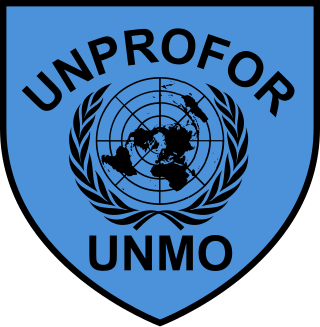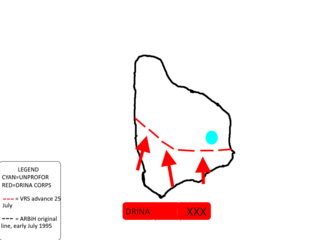
The International Criminal Tribunal for the former Yugoslavia (ICTY) was a body of the United Nations that was established to prosecute the war crimes that had been committed during the Yugoslav Wars and to try their perpetrators. The tribunal was an ad hoc court located in The Hague, Netherlands.

The Srebrenica massacre, also known as the Srebrenica genocide, was the July 1995 genocidal killing of more than 8,000 Bosniak Muslim men and boys in and around the town of Srebrenica, during the Bosnian War. The killings were perpetrated by units of the Bosnian Serb Army of Republika Srpska (VRS) under the command of Ratko Mladić. The Scorpions, a paramilitary unit from Serbia, who had been part of the Serbian Interior Ministry until 1991, also participated in the massacre.

The United Nations Protection Force was the first United Nations peacekeeping force in Croatia and in Bosnia and Herzegovina during the Yugoslav Wars. The force was formed in February 1992 and its mandate ended in March 1995, with the peacekeeping mission restructuring into three other forces.

The Bosnian genocide refers to either the Srebrenica massacre or the wider crimes against humanity and ethnic cleansing campaign throughout areas controlled by the Army of Republika Srpska (VRS) during the Bosnian War of 1992–1995. The events in Srebrenica in 1995 included the killing of more than 8,000 Bosniak men and boys, as well as the mass expulsion of another 25,000–30,000 Bosniak civilians by VRS units under the command of General Ratko Mladić.

The Republika Srpska was a self-proclaimed statelet in Southeastern Europe under the control of the Army of Republika Srpska during the Bosnian War. It claimed to be a sovereign state, though this claim was only partially recognized by the Bosnian government in the Geneva agreement, the United Nations, and Yugoslavia. For the first six months of its existence, it was known as the Serbian Republic of Bosnia and Herzegovina.

Manjača was a concentration camp which was located on mount Manjača near the city of Banja Luka in northern Bosnia and Herzegovina during the Bosnian War and the Croatian War of Independence from 1991 to 1995. The camp was founded by the Yugoslav People's Army (JNA) and authorities of the Republika Srpska (RS) and was used to collect and confine thousands of male prisoners of Bosniak and Croat nationalities.

Zdravko Tolimir was a Bosnian Serb military commander and war criminal, convicted of genocide, conspiracy to commit genocide, extermination, murder, persecution on ethnic grounds and forced transfer. Tolimir was a commander of the Army of Republika Srpska during the Bosnian War. He was Assistant Commander of Intelligence and Security for the Bosnian Serb army and reported directly to the commander, General Ratko Mladić.

Radovan Karadžić is a Bosnian Serb politician who was convicted of genocide, crimes against humanity and war crimes by the International Criminal Tribunal for the former Yugoslavia (ICTY). He was the president of Republika Srpska during the Bosnian War.

United Nations Security Council resolution 819, adopted unanimously on 16 April 1993, after reaffirming resolutions 713 (1991) and all (1992) subsequent resolutions, the Council expressed concern at the actions of Bosnian Serb paramilitary units in towns and villages in eastern Bosnia and Herzegovina, including attacks on civilians, the United Nations Protection Force and disruption to humanitarian aid convoys. The resolution marked the UN's first civilian "safe area" being declared; it failed to prevent the Srebrenica massacre.

The Siege of Srebrenica was a three-year siege of the town of Srebrenica in eastern Bosnia and Herzegovina which lasted from April 1992 to July 1995 during the Bosnian War. Initially assaulted by the Yugoslav People's Army (JNA) and the Serbian Volunteer Guard (SDG), the town was encircled by the Army of Republika Srpska (VRS) in May 1992, starting a brutal siege which was to last for the majority of the Bosnian War. In June 1995, the commander of the Army of the Republic of Bosnia and Herzegovina (ARBiH) in the enclave, Naser Orić, left Srebrenica and fled to the town of Tuzla. He was subsequently replaced by his deputy, Major Ramiz Bećirović.

United Nations Security Council resolution 824, adopted unanimously on 6 May 1993, after considering a report by the Secretary-General Boutros Boutros-Ghali pursuant to Resolution 819 (1993), the council discussed the treatment of certain towns and surroundings as "safe areas" in Bosnia and Herzegovina.

United Nations Security Council resolution 941, adopted unanimously on 23 September 1994, after reaffirming all resolutions on the situation in Bosnia and Herzegovina, the Council discussed violations of international humanitarian law in Banja Luka, Bijeljina and other areas of the country.

United Nations Security Council resolution 1004, adopted unanimously on 12 July 1995, after recalling all resolutions on the situation in the former Yugoslavia, the council, acting under Chapter VII of the United Nations Charter, demanded that Bosnian Serb forces withdraw from the safe area of Srebrenica in Bosnia and Herzegovina and respect the safety of personnel from the United Nations Protection Force (UNPROFOR). The resolution was passed during the Srebrenica massacre.

United Nations Security Council resolution 1009, adopted unanimously on 10 August 1995, after recalling all resolutions on the situation in the former Yugoslavia including resolutions 981 (1995), 990 (1995) and 994 (1995), the Council demanded that the Government of Croatia strictly observe Security Council resolutions after an offensive by the Croatian Army began on 4 August 1995.

United Nations Security Council resolution 1010, adopted unanimously on 10 August 1995, after recalling all resolutions on the situation in the former Yugoslavia and reaffirming Resolution 1004 (1995), the Council demanded that the Bosnian Serbs release all detained persons and permit access to them by international humanitarian organisations.
United Nations Security Council resolution 1019, adopted unanimously on 9 November 1995, after recalling resolutions 1004 (1995) and 1010 (1995) on the situation in Bosnia and Herzegovina and 1009 (1995) concerning Croatia, the Council discussed violations of international humanitarian law in the former Yugoslavia.

The siege of Bihać was a three-year-long siege of the northwestern Bosnian town of Bihać by the Army of the Republika Srpska, the Army of the Republic of Serbian Krajina and Bosnian Muslim dissenters led by Fikret Abdić during the 1992–95 Bosnian War. The siege lasted for three years, from June 1992 until 4–5 August 1995, when Operation Storm ended it after the Croatian Army (HV) overran the rebel Serbs in Croatia and northwest of the besieged town.

Bosnian genocide denial is the act of denying the occurrence of the systematic Bosnian genocide against the Bosniak Muslim population of Bosnia and Herzegovina, or asserting it did not occur in the manner or to the extent that has been established by the International Criminal Tribunal for the former Yugoslavia (ICTY) and the International Court of Justice (ICJ) through proceedings and judgments, and described by comprehensive scholarship.

The siege of Žepa was a three-year long siege of the small Bosnian town of Žepa which had lasted from the summer of 1992 – July 1995 during the Bosnian War. It was initially besieged by the Yugoslav People's Army (JNA) until it switched to the VRS. Throughout the siege, Žepa was part of the Srebrenica–Žepa link in eastern Bosnia. From April 1992 – February 1993, the ARBiH and the civilians of Žepa successfully resisted the Bosnian Serb army due to applying to guerrilla warfare.
















